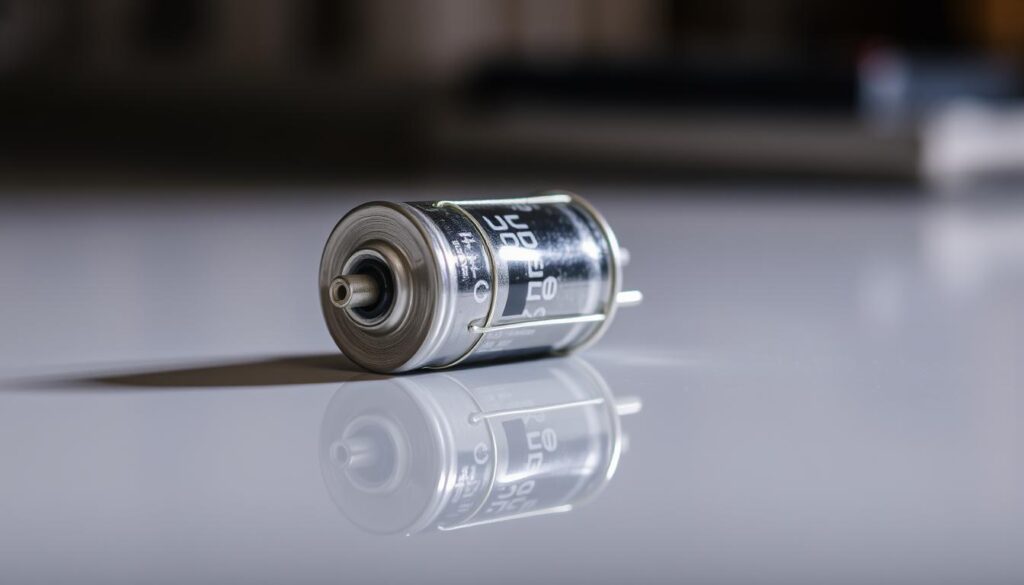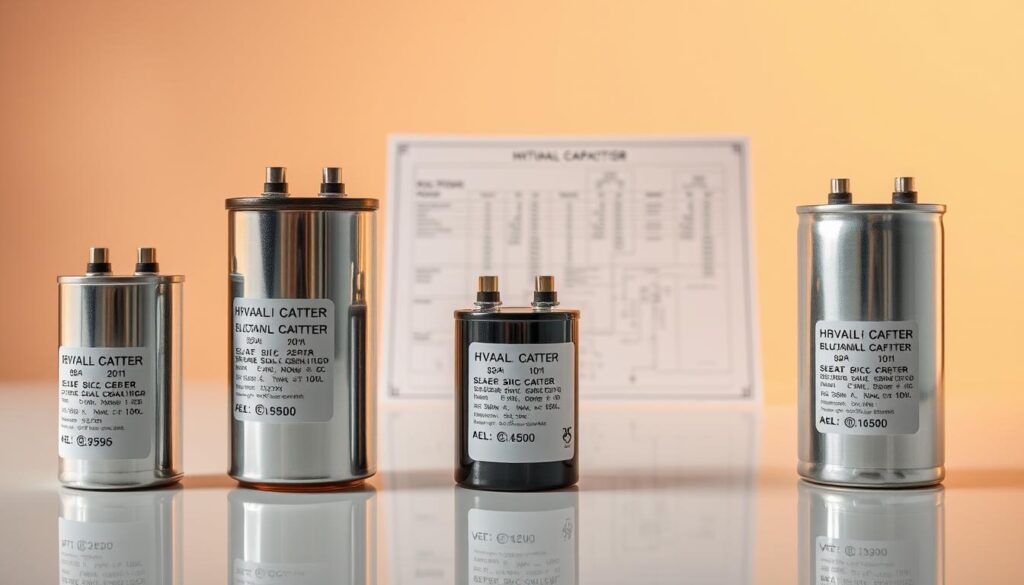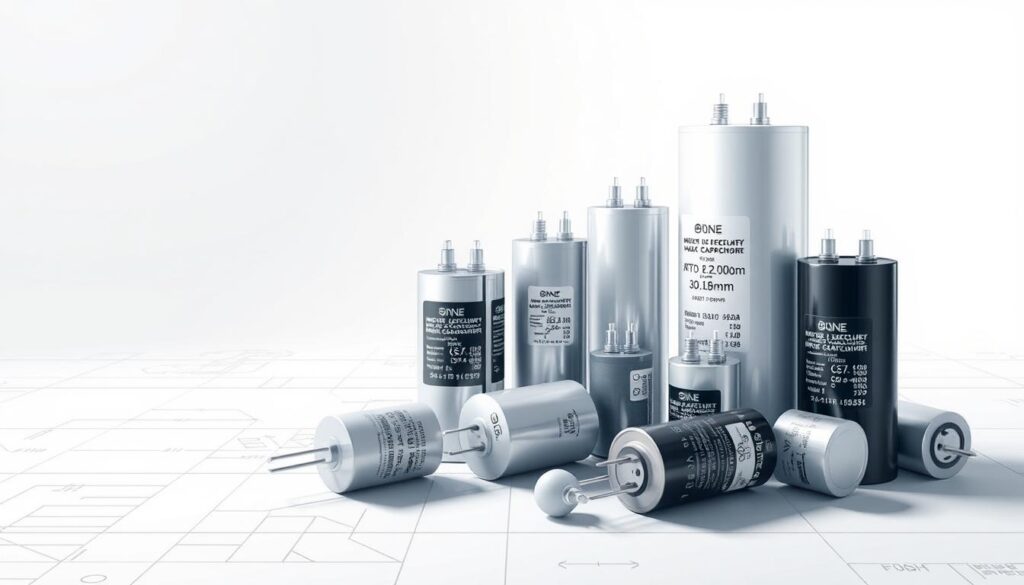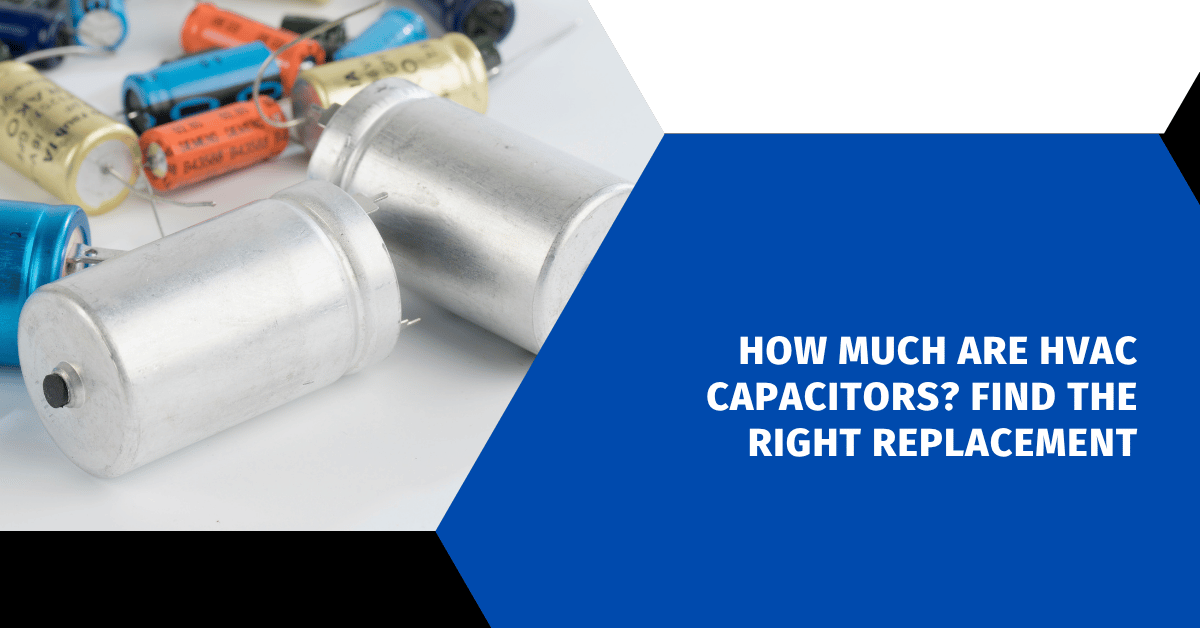Affiliate Disclosure
HVAC Guide Guys is a participant in the Amazon Services LLC Associates Program, an affiliate advertising program designed to provide a means for sites to earn advertising fees by advertising and linking to Amazon.
How Much Are HVAC Capacitors? Ever wondered why your air conditioning stops working on the hottest summer day? It might be a small but important part called a capacitor. Knowing the cost of HVAC capacitors can help avoid unexpected breakdowns and high repair costs.

Homeowners often find the cost of HVAC capacitors surprising. Replacing a typical home system capacitor costs about $180. Prices can go from $100 for smaller units to $400 for more complex systems. Your exact cost will depend on several factors.
Replacing a capacitor is not just about the cost. It’s about making sure your HVAC system works well and reliably. Knowing the cost of HVAC capacitors helps you plan and make smart choices for your home’s cooling system.
Key Takeaways
- Average HVAC capacitor replacement costs range from $100 to $400
- Capacitor prices vary based on system size and complexity
- Professional installation is recommended for accurate replacement
- Regular maintenance can help prevent unexpected capacitor failures
- Quality capacitors can offer long-term cost savings
Table of Contents
Understanding HVAC Capacitor Basics and Their Function
Your HVAC system has many important parts to keep your home comfy. Capacitors are key for your air conditioning to work well. They help manage the electrical current for your HVAC motors.
Capacitors store energy to give your HVAC system the extra power it needs. They’re like batteries but for managing electrical current in your air conditioner.
What Is a Capacitor and How Does It Work
A capacitor stores and releases energy to help your HVAC system’s motors start and keep running. It’s like a power reserve that gives an extra boost when needed. The capacitor helps:
- Generate the initial torque to start motor rotation
- Maintain consistent motor performance
- Protect electrical components from power surges
Types of HVAC Capacitors: Start, Run, and Dual-Run
There are different types of HVAC capacitors for various functions in your cooling system. Knowing about hvac capacitor types helps you spot problems and keep your system running right:
| Capacitor Type | Primary Function | Typical Usage |
|---|---|---|
| Start Capacitor | Provides initial motor startup power | Helps overcome initial motor resistance |
| Run Capacitor | Maintains consistent motor operation | Keeps motors running efficiently |
| Dual-Run Capacitor | Combines start and run functions | Used in compact HVAC systems |
The Role of Capacitors in Your HVAC System
Getting the right size for your hvac capacitor is key for your system to work its best. The wrong size can make your motor less efficient, use more energy, and even break your system. HVAC pros carefully pick the right capacitor for your system to make sure it works well and lasts long.
Average HVAC Capacitor Replacement Costs
Knowing the cost of hvac capacitor replacement is key for homeowners. It helps keep cooling systems running well. The price to replace an HVAC capacitor can change a lot. But, understanding this can help you plan your budget.
Several things affect hvac capacitor prices. Usually, homeowners pay between $100 and $400 for a professional install.
National Average Cost Breakdown
- Parts cost: $50 – $250
- Labor cost: $50 – $150
- Total average replacement: $180
Factors Affecting Capacitor Prices
Many things can change the cost of replacing your hvac capacitor:
- Capacitor type (start, run, or dual-run)
- Brand quality
- Local labor rates
- Complexity of your HVAC system
Labor vs. Parts Cost Analysis
Your total cost usually includes parts and labor. HVAC technicians charge $50 to $150 for installation. This can be up to 50% of the total cost.
Pro tip: Regular maintenance can help prevent unexpected capacitor failures and reduce overall replacement costs.
Explore Our HVAC Shop
Looking for top-rated HVAC tools, parts, and accessories? Visit our shop and find the perfect solution for your needs.
Visit the ShopHow Much Are HVAC Capacitors Based on Unit Size
Knowing how much HVAC capacitors cost is key. It depends on your home’s size. The size of your air conditioning unit affects the capacitor’s price and what you need.
Different home sizes need different capacitors. The size of your HVAC unit plays a big role in the capacitor’s cost. Here’s why:
- Smaller apartments (1-2 bedrooms): Lower capacity capacitors
- Medium homes (3-4 bedrooms): Standard capacity capacitors
- Large homes (5+ bedrooms): High-capacity capacitors
Capacitor prices vary based on what your unit needs. A small apartment might need a capacitor costing $10-$25, while a large home could require a capacitor priced between $50-$100. This is because different HVAC systems have different electrical needs.
Several factors influence the cost of HVAC capacitors:
- Total square footage of your home
- HVAC system’s electrical requirements
- Manufacturer specifications
- Voltage and microfarad ratings
Professional HVAC technicians can figure out the right capacitor size for you. Always get an expert’s advice to pick the best capacitor for your home’s cooling needs.
Quality Levels and Price Differences in Capacitors
Choosing the right HVAC capacitor can save you money and prevent system failures. It affects both the upfront cost and the long-term lifespan of your cooling system.

Not all capacitors are the same. The market has basic to premium models, each with its own features. These features impact performance and durability.
Basic vs Premium Capacitor Options
When looking at capacitors, you’ll find two main quality levels:
- Basic Capacitors
- Lower upfront cost
- Typical lifespan of 1-2 years
- Minimal warranty protection
- Premium Capacitors
- Higher initial investment
- Extended lifespan of 5-7 years
- Comprehensive warranty coverage
Warranty Considerations and Coverage
“Investing in a quality capacitor is like buying insurance for your HVAC system.”
Premium capacitors usually have better warranties. These warranties can protect your investment and give you peace of mind. They might even cover replacement costs if the component fails early.
Long-term Cost Benefits of Quality Capacitors
Premium capacitors may cost more at first, but they save you money in the long run. They reduce the chance of system breakdowns, lower repair costs, and keep your HVAC system running efficiently for longer.
Explore Our HVAC Shop
Looking for top-rated HVAC tools, parts, and accessories? Visit our shop and find the perfect solution for your needs.
Visit the ShopCommon Signs of Capacitor Failure
Spotting early signs of hvac capacitor failure can prevent expensive fixes and keep your home cool. Your air conditioning system shows signs of capacitor trouble through specific symptoms. These signs are important for homeowners to notice.
Understanding the first signs of trouble is key to HVAC capacitor troubleshooting. These signs can alert you to problems before they get worse.
- Delayed System Start: Your air conditioner takes several minutes to activate after turning it on
- Unusual Sounds: Persistent humming or buzzing from the outdoor unit
- Fan Performance: Fan spinning slowly or not spinning at all
- Cooling Inefficiency: Your home takes longer to reach desired temperatures
- Energy Consumption: Unexpectedly high electricity bills
- Unexpected Shutdowns: AC unit turning off randomly
Checking your capacitor visually can also show problems. Look for signs like:
- Bulging or swollen capacitor top
- Leaking or corroded terminals
- Burn marks or discoloration
| Symptom | Potential Capacitor Issue |
|---|---|
| Slow System Start | Weakening capacitor charge |
| Intermittent Operation | Capacitor nearing failure |
| Unusual Noises | Internal capacitor damage |
While these signs suggest capacitor failure, getting a pro’s opinion is vital. A certified HVAC technician can do detailed tests. They’ll confirm capacitor problems and suggest the right fixes or replacements.
Capacitor Pricing by HVAC System Type
HVAC capacitor prices change a lot based on your system type. Each system needs its own capacitor setup, affecting cost and complexity.

HVAC systems have many types, each needing its own capacitor. Your system’s type decides the capacitor types and costs.
Air Handler Capacitor Costs
Air handler capacitors cost between $50-$150. They are key for moving cooled air around your home. Prices depend on:
- Capacitor brand quality
- Electrical specs
- How hard it is to replace
Condensing Unit Capacitor Prices
Condensing unit capacitors cost $75-$250. They control the compressor and fan motor, vital for cooling.
“Choosing the right capacitor is key for your HVAC system’s performance and energy use.”
Packaged Unit Capacitor Expenses
Packaged unit capacitors cost $100-$300. These units have everything in one, which can make replacement more expensive.
| HVAC System Type | Capacitor Price Range | Typical Replacement Frequency |
|---|---|---|
| Air Handler | $50-$150 | 5-7 years |
| Condensing Unit | $75-$250 | 6-8 years |
| Packaged Unit | $100-$300 | 4-6 years |
Getting expert advice is vital for picking and installing the right capacitor for your HVAC system.
Explore Our HVAC Shop
Looking for top-rated HVAC tools, parts, and accessories? Visit our shop and find the perfect solution for your needs.
Visit the ShopProfessional Installation vs DIY Replacement
Homeowners often face a big decision when it comes to replacing an HVAC capacitor. They can try to do it themselves or call a professional. HVAC systems have complex electrical parts that need special skills.
Before you decide to replace the capacitor yourself, think about these things:
- Safety risks of working with electrical systems
- Potential warranty implications
- Technical expertise required
- Precision of component selection
Professional HVAC technicians have big advantages when it comes to capacitor replacement. They know how to handle the electrical needs and can find other problems that might cause capacitor failure.
The cost for professional installation is usually between $150 and $400. This includes parts and labor. This investment offers many benefits:
- Guaranteed workmanship
- Manufacturer warranty protection
- Comprehensive system diagnostic
- Reduced risk of future system damage
Your HVAC system is a big investment in your home. Choosing between DIY and professional replacement can save you money and prevent system failures later on.
Factors That Impact Capacitor Lifespan
Your HVAC system’s capacitor is key to its performance and life. Knowing what affects its lifespan helps keep it working well. This avoids sudden failures.
Environmental Challenges
Outside conditions greatly affect capacitor life. Heat, humidity, and extreme temperatures can wear it down faster. Where your HVAC system is located matters a lot.
- High-temperature areas stress the capacitor more
- Coastal areas with salt air cause corrosion
- Industrial zones with chemicals make capacitors less reliable
Usage Patterns and Maintenance
Regular care can make your capacitor last longer. But, using it too much, installing it wrong, or not checking it can shorten its life.
- Get your HVAC system checked every year
- Clean the electrical parts around it
- Watch for signs of system trouble
Power Quality Considerations
Stable power is vital for your capacitor. But, voltage spikes, brownouts, and uneven power can damage it.
| Power Issue | Potential Capacitor Impact |
|---|---|
| Voltage Fluctuations | Wear it down faster |
| Power Surges | Can damage it right away |
| Electrical Noise | Can make it work less well over time |
Pro tip: Think about getting whole-house surge protectors. They help keep your HVAC system’s parts safe and extend capacitor life.
Explore Our HVAC Shop
Looking for top-rated HVAC tools, parts, and accessories? Visit our shop and find the perfect solution for your needs.
Visit the ShopWhen to Replace vs Repair Your Capacitor
Deciding whether to replace or repair an HVAC capacitor can save you a lot of time and money. Your system’s performance depends on this key component working right during hvac capacitor troubleshooting.
- Capacitance measurements outside +/- 10% of rated specs
- Visible physical damage or swelling
- Consistent system performance issues
- Age of the existing capacitor (usually 5-10 years)
Professional HVAC technicians say to replace when tests show big performance drops. Small electrical issues can turn into big system failures fast.
“A proactive approach to capacitor maintenance prevents costly emergency repairs.” – HVAC Industry Expert
Here are some scenarios for replacement:
| Condition | Recommended Action |
|---|---|
| Minor electrical inconsistencies | Professional diagnostic test |
| Significant capacitor wear | Full capacitor replacement |
| System repeated failures | Complete system evaluation |
While DIY repairs might look appealing, professional hvac capacitor troubleshooting is safer and more accurate. Timely replacement keeps your HVAC system running well for years.
Conclusion
Knowing the cost of HVAC capacitors is key to keeping your home’s climate control working right. The price to replace a capacitor can be between $100 and $500. This depends on your HVAC system and the quality of parts you pick. Making the right choice can save you a lot of money and avoid sudden system failures.
Regular upkeep is vital for your HVAC capacitors to last longer. Keeping an eye on your system and fixing issues early can save you money. Experts suggest getting your system checked once a year to catch capacitor problems before they get worse.
When it’s time to replace your HVAC capacitor, choose quality and get a pro to install it. While doing it yourself might seem easy, a trained technician can pick and install the right parts. This reduces the chance of future problems. High-quality capacitors with good warranties mean your system will work well for a long time.
Every HVAC system is different, and knowing what you need is important for efficiency. Being proactive and informed about capacitor replacement helps keep your home comfortable and your wallet happy.

